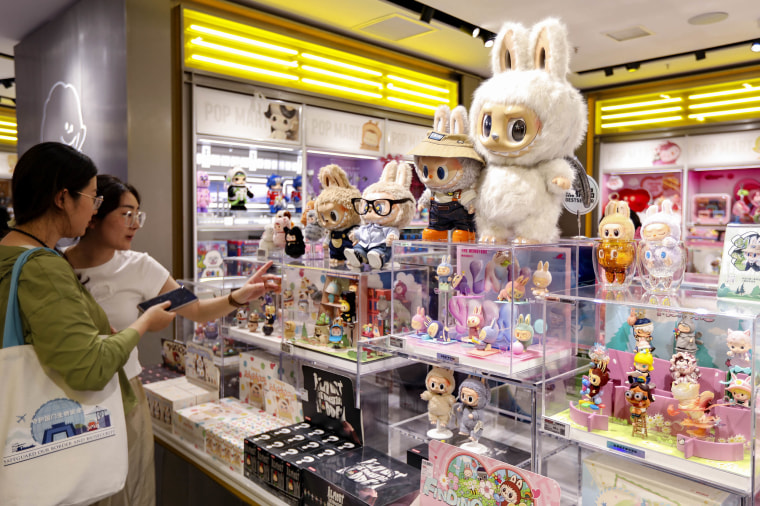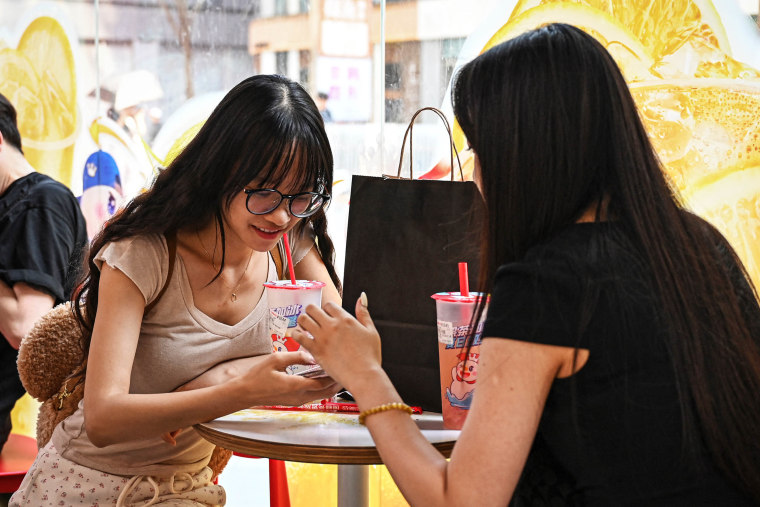Younger Chinese language customers are spending to really feel good amid slower financial development
HONG KONG — Younger folks in China will not be shopping for automobiles or homes, however there’s at all times cash for milk tea and toys.
It’s a difficult time to be a teen in China: The world’s second-biggest economic system is rising far slower than it was when their dad and mom have been their age, with the U.S.-China commerce battle threatening to additional weigh on development. Competitors for jobs is cutthroat and month-to-month youth unemployment stands at about 15% on common, with Chinese language universities churning out a document 12.22 million new graduates this yr.
Feeling “besieged” in life within the face of those financial obstacles, younger Chinese language customers at house and overseas are discovering consolation in smaller purchases.
“I spend to make myself joyful,” mentioned Kitty Lu, a 23-year-old Chinese language pupil in Melbourne, Australia. “It sounds a bit reckless, however I do have a quantity in my thoughts.”
Lu mentioned most of her spending goes towards supporting celebrities she likes. Often, she permits herself a “small indulgence” within the type of “blind field” toys resembling Disney dolls or the Labubu monster collectible figurines which have change into a world frenzy.
“To be sincere, I’m not that into these dolls,” she mentioned, including that the acquisition is extra about having enjoyable with buddies as they open the blind field collectively to see which doll is inside.
Lu’s spending habits mirror a rising pattern lately amongst younger Chinese language who present “low curiosity” in large purchases resembling homes and automobiles however are embracing meals and cultural merchandise that supply “instantaneous emotional gratification,” based on the Fudan Growth Institute, a Shanghai-based assume tank.

This phenomenon, often known as “emotional consumption,” has resulted in common annual development of about 12% in industries together with movies and video games since 2013, based on a report in March by the Chinese language software program and web companies firm Kingsoft. The general marketplace for emotional consumption is projected to exceed $270 billion this yr, the report mentioned.
Candy drinks, low costs, happier life
One of many largest beneficiaries of Chinese language shopper traits has been the nation’s beverage sector, which based on S&P International is anticipated to develop as much as 6% this yr.
Mixue, a bubble tea chain identified for its low-cost drinks, now has extra shops worldwide — over 45,000, with almost 10% of them outdoors mainland China — than some other meals and beverage chain, together with McDonald’s, which has a world retailer depend of 43,000, and Starbucks, with 38,000. In March, Mixue’s shares jumped greater than 40% on its market debut in Hong Kong.
The model’s success stems largely from its low costs and speedy enlargement, particularly in much less developed cities, as Chinese language folks alter their spending habits whereas grappling with job safety and different financial considerations.
Kelsey Yu, 23, a graduate pupil in Beijing, mentioned she purchased a bottle of lemonade from Mixue for the equal of lower than $1 on a go to in April to the southern Chinese language metropolis of Jieyang.
“The drink quenched my thirst. It had a big portion and was low-cost,” she mentioned, including that Mixue’s gadgets are “higher worth for cash” than these of many native opponents.
Yu mentioned that as a foodie, she drinks tea-based drinks at the least a couple of times per week and should “indulge a bit extra” whereas touring.
“I normally order milk tea after I’m feeling drained or if I simply need to have a superb time,” she mentioned. “However I’ve self-control. So I gained’t have it each day.”
A sophisticated image of Chinese language consumption
Whereas U.S. officers typically say Chinese language customers should not spending sufficient, the state of affairs just isn’t as clear-cut as it’s portrayed, analysts mentioned.
Previously quarter-century, China’s shopper spending has grown a mean of 8% or extra annually, one of many highest charges amongst main economies. However it has been outstripped by funding, making consumption a smaller a part of China’s general GDP.
Talking on the World Financial Discussion board’s “Summer time Davos” occasion in Tianjin on Wednesday, Chinese language Premier Li Qiang mentioned China sought to change into a “mega-sized consumption powerhouse.”
Boosted by authorities subsidies, China’s retail gross sales grew 6.4% in Could, the quickest price since late 2023.

Gross sales throughout this yr’s monthlong 618 on-line buying competition, which ended June 18, have been a document 855.6 billion yuan ($119 billion), based on retail information supplier Syntun, 15.2% increased than final yr.
Younger Chinese language particularly are “residing frugally to spend large,” based on state-backed analysis. Although they’re budget-conscious in terms of day by day requirements, they “don’t hesitate to splurge” for his or her hobbies and happiness, it mentioned.
“I’d reasonably spend 300 yuan ($42) on an ideal meal, and if the meals is admittedly good, I might assume it’s completely value it,” Yu mentioned. “But when it’s a 300-yuan piece of clothes, I would hesitate.”
Amid China’s financial challenges, middle-class customers are much less brand-conscious and like cheaper options, mentioned Yaling Jiang, founding father of ApertureChina, a consulting agency that makes a speciality of shopper analysis.
“Now saving is seen as cool, and in search of worth is seen as cool,” Jiang mentioned. “I believe the downturn undoubtedly modified the tradition of spending.”
Chinese language mallgoers nowadays spend cash nearly solely on the primary and second flooring, the place meals and beverage retailers are concentrated, Jiang mentioned.
“Individuals are strolling across the mall with a cup of milk tea or espresso,” she added, taking a look at what’s available in shops earlier than going house to purchase cheaper options on-line.
China’s luxurious market, which had accounted for nearly a 3rd of world gross sales, declined 18% to twenty% final yr, based on a January report by Bain and Firm.
“I believe there may be much less deal with the social standing comparability, and extra deal with what brings them private happiness,” mentioned Lynn Music, chief economist for higher China at ING, a post-pandemic change that has additionally been seen elsewhere.
Shoppers in China are each buying and selling up and spending down, relying on the sector, mentioned Shan Guo, a accomplice at Hutong Analysis, an funding advisory group primarily based in Hong Kong.
“They don’t seem to be shopping for luxurious baggage, however they’re shopping for Pop Mart,” Guo mentioned, referring to the Chinese language retailer behind the Labubu toys. “Labubu may be fairly costly.”
Regardless of considerations about slower financial development in China and elsewhere, Lu, the Melbourne pupil, mentioned her buddies are nonetheless “fairly prepared to spend for enjoyable.”
“They’re not large spenders,” she mentioned. “They’re simply joyful to deal with themselves when having a superb time.”

